九年级英语单元知识点总结
九年级英语上册单元重要知识点总结

九年级英语上册单元重要知识点总结九年级英语上册共有8个单元,包括Unit 1 My New Teachers、Unit 2 How Often Do You Exercise、Unit 3 I'm more outgoing than my sister、Unit 4 Don't eat in class、Unit 5 What are the shirts made of、Unit 6 I'm going to study computer science、Unit 7 Would you mind turning down themusic、Unit 8 How do you make a banana milk shake?下面对每个单元的重要知识点进行总结:Unit 1 My New Teachers1.介绍自己和他人的基本信息,包括姓名、年龄、学校、家庭成员等。
2.学习询问他人的基本信息,如What's his/her name? How old is he/she?Which school does he/she go to?等。
3.学习询问他人的职业和爱好,如What does he/she do? What are his/herhobbies?等。
4.学习表达个人的职业和爱好,如I'm a student. My hobbies are playingbasketball and listening to music.等。
Unit 2 How Often Do You Exercise1.学习询问他人的日常活动频率,如How often do you exercise? Howoften does he/she watch TV?等。
2.学习回答关于日常活动频率的问题,如I exercise three times a week.He/She watches TV every day.等。
九年级英语上册各单元知识点归纳

九年级英语上册各单元知识点归纳第一单元:基础知识1. 介词短语的使用:介词短语是由一个介词和它的宾语组成的短语,用来表示时间、地点、方向、原因等。
例如:"on the table"(在桌子上),"in the park"(在公园里)。
介词短语在句子中作状语、定语、宾语等。
需要注意介词与宾语之间的搭配。
2. 动词的时态和语态:英语中的动词有多种时态和语态。
常见的时态有一般现在时、一般过去时、一般将来时等。
常见的语态有主动语态和被动语态。
时态用于表示动作发生的时间,语态用于表示动作的执行者。
例如:"She is reading a book."(她正在读一本书)。
需要注意时态和语态的用法和变化规则。
3. 名词的单复数形式:英语中的名词有单数和复数形式。
复数形式一般是在名词后面加-s或-es。
有些名词的复数形式较特殊,需要记忆。
例如:"a cat"(一只猫)的复数形式是"cats"(多只猫)。
需要注意名词的单复数形式在句子中的搭配和用法。
第二单元:阅读理解1. 完型填空:完型填空是一种考察学生对语境理解和词汇运用能力的题型。
在完型填空中,通常给出一篇文章和一些空格,要求学生根据文章内容和语境选择正确的单词或短语填入空格中。
通常需要结合文章整体逻辑和上下文意义来填写正确答案。
2. 阅读理解题:阅读理解题是一种考察学生阅读理解能力和推理能力的题型。
通常会给出一篇短文或文章,然后根据文章内容提出一些问题,要求学生根据文章内容和推理来回答问题。
需要学会熟练阅读和理解文章,抓住关键信息和主题,并能运用推理等能力来回答问题。
第三单元:语法知识1. 直接引语和间接引语:在英语中,当我们引述别人的话时,可以使用直接引语和间接引语。
直接引语是直接引用别人所说的话,使用引号将其包围;间接引语是将别人所说的话转述出来。
例如:直接引语:"I am happy," she said.(她说:“我很开心。
九年级英语单元知识点
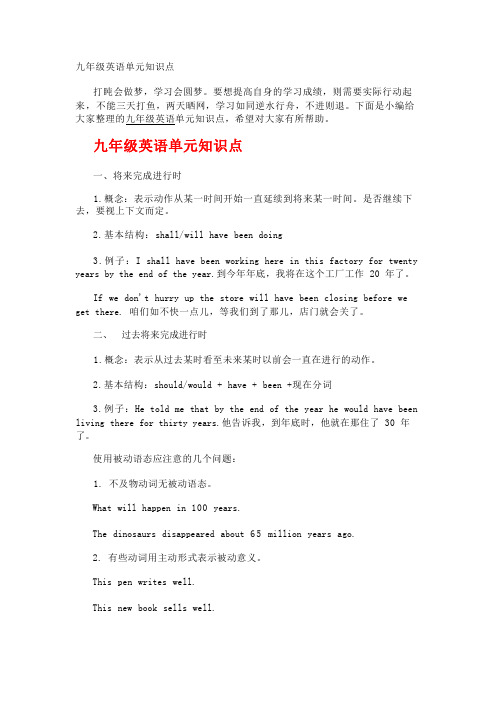
九年级英语单元知识点打盹会做梦,学习会圆梦。
要想提高自身的学习成绩,则需要实际行动起来,不能三天打鱼,两天晒网,学习如同逆水行舟,不进则退。
下面是小编给大家整理的九年级英语单元知识点,希望对大家有所帮助。
一、将来完成进行时1.概念:表示动作从某一时间开始一直延续到将来某一时间。
是否继续下去,要视上下文而定。
2.基本结构:shall/will have been doing3.例子:I shall have been working here in this factory for twenty years by the end of the year.到今年年底,我将在这个工厂工作 20 年了。
If we don't hurry up the store will have been closing before we get there. 咱们如不快一点儿,等我们到了那儿,店门就会关了。
二、过去将来完成进行时1.概念:表示从过去某时看至未来某时以前会一直在进行的动作。
2.基本结构:should/would + have + been +现在分词3.例子:He told me that by the end of the year he would have been living there for thirty years.他告诉我,到年底时,他就在那住了 30 年了。
使用被动语态应注意的几个问题:1. 不及物动词无被动语态。
What will happen in 100 years.The dinosaurs disappeared about 65 million years ago.2. 有些动词用主动形式表示被动意义。
This pen writes well.This new book sells well.3. 感官动词或使役动词使用省略 to 的动词不定式,主动语态中不带 to ,但变为被动语态时,须加上 to 。
英语九年级全一册6单元知识点
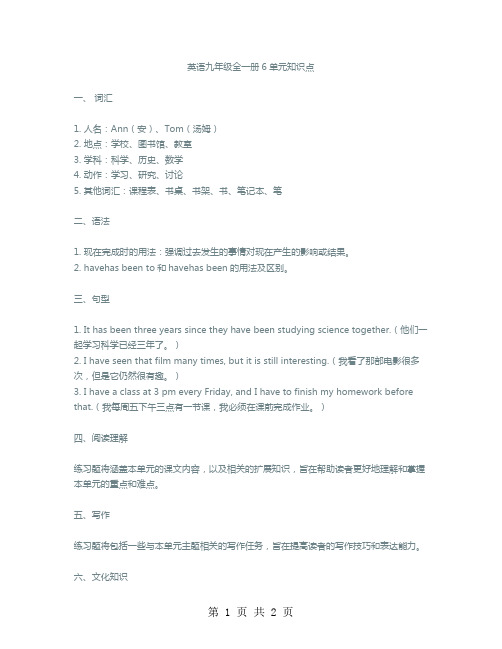
英语九年级全一册6单元知识点一、词汇1. 人名:Ann(安)、Tom(汤姆)2. 地点:学校、图书馆、教室3. 学科:科学、历史、数学4. 动作:学习、研究、讨论5. 其他词汇:课程表、书桌、书架、书、笔记本、笔二、语法1. 现在完成时的用法:强调过去发生的事情对现在产生的影响或结果。
2. havehas been to和havehas been的用法及区别。
三、句型1. It has been three years since they have been studying science together.(他们一起学习科学已经三年了。
)2. I have seen that film many times, but it is still interesting.(我看了那部电影很多次,但是它仍然很有趣。
)3. I have a class at 3 pm every Friday, and I have to finish my homework before that.(我每周五下午三点有一节课,我必须在课前完成作业。
)四、阅读理解练习题将涵盖本单元的课文内容,以及相关的扩展知识,旨在帮助读者更好地理解和掌握本单元的重点和难点。
五、写作练习题将包括一些与本单元主题相关的写作任务,旨在提高读者的写作技巧和表达能力。
六、文化知识本单元还将涉及一些与科学和历史相关的文化知识,包括一些科学原理和历史事件,以及它们在现实生活中的应用。
读者可以通过了解这些知识,更好地理解西方文化和社会。
总的来说,本单元的学习内容丰富,涵盖了词汇、语法、句型、阅读理解、写作和文化知识等多个方面。
通过系统地学习和练习,读者可以更好地掌握本单元的知识点,提高自己的英语水平。
九年级英语第五单元知识点总结

九年级英语第五单元知识点总结一、重点单词1. belong- 用法:belong to sb. / sth.,表示“属于某人/某物”,无被动语态,也不用于进行时态。
例如:This book belongs to me.(这本书属于我。
)2. picnic- 相关短语:go for a picnic(去野餐);have a picnic(进行野餐)。
例如:We are going for a picnic this weekend.(我们这个周末打算去野餐。
)3. author4. hair band- 词义:发带。
例如:I found a hair band on the playground.(我在操场上发现了一个发带。
)5. possibly- 词性:副词,词义:可能地;也许。
例如:It may possibly rain tomorrow.(明天也许会下雨。
)6. drop- 用法:- 作动词,有“落下;掉下;使落下”等意思。
例如:He dropped his pen on the floor.(他把笔掉在地上了。
)- 还可表示“放弃(想法、计划等)”,例如:He dropped the idea of going abroad.(他放弃了出国的想法。
)- 相关短语:drop by(顺便访问);drop in on sb.(顺便拜访某人);drop off(减少;让……下车)。
7. symphony- 词义:交响乐;交响曲。
例如:Beethoven wrote many famous symphonies.(贝多芬写了许多著名的交响曲。
)8. optometrist- 词义:验光师;配镜师。
例如:You should go to an optometrist to check your eyesight.(你应该去验光师那里检查视力。
)9. appointment- 用法:make an appointment(预约);have an appointment(有约会)。
九年级上册英语第三单元知识点总结

九年级上册英语第三单元知识点总结一、重点单词。
1. restroom.- 名词,意为“(美)洗手间;公共厕所”。
例如:I need to find a restroom.(我需要找个洗手间。
)2. stamp.- 名词,“邮票;印章”;也可作动词,“跺脚;盖章”。
- 作名词:He collects stamps.(他集邮。
)- 作动词:She stamped her foot angrily.(她生气地跺了跺脚。
)3. bookstore.- 名词,“书店”。
例如:There is a big bookstore near my school.(我学校附近有一家大书店。
)4. beside.- 介词,“在……旁边;在……附近”。
例如:The boy is standing besidehis mother.(那个男孩站在他妈妈旁边。
)5. postcard.- 名词,“明信片”。
例如:I sent a postcard to my friend.(我给我的朋友寄了一张明信片。
)6. pardon.- 可作名词,“原谅;宽恕;对不起”;也可作动词,“原谅;赦免”。
- 作名词:I beg your pardon.(请再说一遍。
)- 作动词:Pardon me for being late.(原谅我迟到了。
)7. washroom.- 名词,“洗手间;厕所”(尤指公共建筑物内的)。
例如:The washroom is on the second floor.(洗手间在二楼。
)8. bathroom.- 名词,“浴室;洗手间”。
例如:There is a bathtub in the bathroom.(浴室里有一个浴缸。
)9. normal.- 形容词,“正常的;一般的”。
例如:It's normal to feel tired after a long day.(漫长的一天后感到疲倦是正常的。
最全面人教版九年级上册英语各单元知识点总复习归纳总结

最全面人教版九年级上册英语各单元知识点总复习归纳总结Unit 1: Hello!- Greetings and introductions: Learn how to greet people and introduce yourself.- Numbers: Practice numbers and learn how to say and write them.- Personal information: Learn how to ask and answer questions about personal information like name, age, and nationality.Unit 2: How Do You Study for a Test?- Study methods: Learn different ways to study for tests and improve learning efficiency.- Time management: Understand the importance of time management in studying.- Test preparation: Learn strategies for preparing effectively for exams.- Giving advice: Practice giving and receiving study advice using modal verbs.Unit 3: What Are You Doing for Vacation?- Vacation plans: Learn how to talk about your plans for the vacation.- Leisure activities: Discuss different leisure activities and preferences.- Present continuous tense: Understand and use the present continuous tense to talk about present actions.- Future plans: Express future plans and intentions using "be going to" and present continuous tense.Unit 4: I Used to Be Afraid of the Dark.- Past experiences: Learn how to talk about past experiences using "used to" and simple past tense.- Phobias and fears: Discuss different phobias and fears people may have.- Narrative tenses: Understand and use narrative tenses to talk about past events.Unit 5: What is the highest mountain in the world?- Geography and landmarks: Learn about different geographical features and famous landmarks.- Describing places: Practice describing different places using adjectives.- Research skills: Learn how to conduct research and gather information about different topics.Unit 6: Why don't you get her a scarf?- Giving suggestions: Practice suggesting and responding to suggestions.- Gift ideas: Discuss different gift ideas for various occasions.- Buying clothes: Learn how to describe and buy clothes in a store.- Preferences: Express personal preferences and opinions using adjectives.Unit 7: Teenagers should be allowed to choose their own clothes.- Rules and regulations: Discuss rules and regulations for teenagers.- Arguments for and against: Present arguments for and against a given topic.- Writing an opinion article: Learn how to write an opinion article expressing personal views.- Persuasive language: Use persuasive language to convince others of a certain viewpoint.Unit 8: I'll help clean up the city parks.- Volunteering: Discuss different volunteer activities and their benefits.- Environmental issues: Learn about environmental problems and ways to address them.- Expressing willingness: Use "will" and "be willing to" to express willingness to help.- Making suggestions: Practice making suggestions on how to improve the environment.Unit 9: What does he look like?- Physical appearance: Learn vocabulary to describe people's physical appearance.- Personality traits: Discuss different personality traits and their impact on people's lives.- Describing people: Practice describing people using adjectives and sentence structures.- Role plays: Act out different scenarios and describe the characters involved.以上是最全面人教版九年级上册英语各单元知识点的总复习归纳总结。
2024九年级英语上册Unit8必背知识点
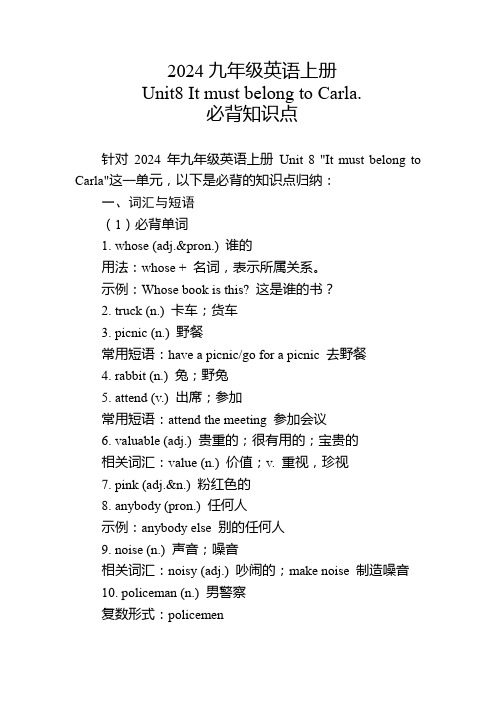
2024九年级英语上册Unit8 It must belong to Carla.必背知识点针对2024年九年级英语上册Unit 8 "It must belong to Carla"这一单元,以下是必背的知识点归纳:一、词汇与短语(1)必背单词1. whose (adj.&pron.) 谁的用法:whose + 名词,表示所属关系。
示例:Whose book is this? 这是谁的书?2. truck (n.) 卡车;货车3. picnic (n.) 野餐常用短语:have a picnic/go for a picnic 去野餐4. rabbit (n.) 兔;野兔5. attend (v.) 出席;参加常用短语:attend the meeting 参加会议6. valuable (adj.) 贵重的;很有用的;宝贵的相关词汇:value (n.) 价值;v. 重视,珍视7. pink (adj.&n.) 粉红色的8. anybody (pron.) 任何人示例:anybody else 别的任何人9. noise (n.) 声音;噪音相关词汇:noisy (adj.) 吵闹的;make noise 制造噪音10. policeman (n.) 男警察复数形式:policemen11. wolf (n.) 狼复数形式:wolves12. happening (n.) 事件;发生的事情13. uneasy (adj.) 担心的;不安的14. laboratory (n.) 实验室15. coat (n.) 外套;外衣16. sleepy (adj.) 困倦的;瞌睡的相关短语:feel sleepy 感到困倦;asleep (adj.) 睡着的;fall asleep 入睡;sleeping (adj.) 熟睡的17. outdoors (adv.) 在户外18. suit (n.) 西服;套装v. 适合;suit sb. fine = fit sb. well 非常适合某人19. alien (n.) 外星人20. express (v.) 表示;表达n. expression 表情,表达21. circle (n.) 圆圈v. 圈出22. Britain (=Great Britain) 大不列颠23. receive (v.) 接待;接受;收到注意:与accept区分,receive仅表示客观上收到,主观上接受用accept24. leader (n.) 领导者;领袖v. lead 领导;导致25. medical (adj.) 医疗的;医学的n. medicine 药;medical research 医学研究26. purpose (n.) 目的;目标常用短语:the purpose of ……的目的;on purpose 故意地(2)必背短语1. belong to 属于2. pick up 捡起;拾起3. used to 过去常常4. nothing much 没什么事5. at first 起初6. in the neighborhood 在街区里7. go away 离开8. listen to classical music 听古典音乐9. at school 上学;求学10. go to the concert 去听音乐会11. have any/some idea 知道12. a math test on algebra 有关代数的数学考试13. the final exam 期末考试14. because of 因为15. a present for his mother 送给他妈妈的礼物16. run for exercise 跑步锻炼17. milk shake 奶昔18. turn on/off 打开/关上19. pour…into…将…...倒入…...20. a cup of yogurt 一杯酸奶21. on Saturday morning 在星期六早上22. cut up 切碎23. put…into…将…...放入...…24. one more thing 还有一件事25. a piece of 一片/一张/一块26. at this time 在此时27. a few 几个28. fill…with…用…装满29. cover…with…用......覆盖30. mix up 混淆;混合31. take turns 轮流32. try one's best 尽某人最大的努力33. make a difference 有影响;起作用34. in a hurry 匆忙地35. on one's way 在某人去……的路上二、语法结构1. 情态动词must, might, could, can't表示推测must 表示肯定的推测,意为“一定,肯定”。
九年级英语第1单元-知识点总结

九年级英语第1单元-知识点总结第一部分:基础词汇和短语1. Greetings and Introductions在英语中,问候和介绍是日常生活中常用到的交际用语。
常见的问候方式包括:“Hello!”、“Hi!”、“Goodmorning/afternoon/evening!”等。
而自我介绍的常用表达为“I am...”、“My name is...”等。
2. Classroom English在教室里,学生和老师之间的交流需要使用一些特定的英语表达。
例如,“May I come in?”、“May I go to the washroom?”、“Can you repeat that, please?”等。
3. Numbers and Dates数字和日期是我们日常生活中无法绕开的内容。
需要掌握基本的数字、基数词、序数词等,以及日期的表达,例如“Today is...”、“It's Monday.”、“My birthday is on October 15th.”等。
4. Time谈论时间也是英语学习的重要内容,掌握“in themorning/afternoon/evening”、“at 9 o'clock”、“from...to...”等表达方式非常实用。
5. School Subjects and Facilities学校科目和设施是我们在学校中经常需要提及的。
诸如“Mathematics”、“Science”、“Library”、“Computer lab”等词汇需要熟练掌握。
6. Adjectives and Adverbs形容词和副词是用来描述人、事物和行为的重要词汇。
例如“beautiful”、“kind”、“quickly”、“carefully”等。
第二部分:语法知识点1. Simple Present Tense学习现在时态是英语学习的基础。
在这一时态中,主语和动词的形式要保持一致,例如“I play football.”、“He dances well.”。
九年级上册英语1到5单元知识点

九年级上册英语1到5单元知识点总结1. Unit 1: Best friends- Vocabulary: friendship,panion, trust, support- Grammar: present continuous tense, possessive pronouns - Topic: The importance of friendship and how to be a good friend2. Unit 2: English around the world- Vocabulary: bilingual, dialect, accent, globalization- Grammar:parative and superlative adjectives, adverbs of frequency- Topic: The influence of English as a global language and its variations in different countries3. Unit 3: Travel journal- Vocabulary: destination, itinerary, amodation, excursion- Grammar: past simple tense, past continuous tense- Topic: Sharing travel experiences, discussing favorite destinations, and describing past trips4. Unit 4: Great inventions- Vocabulary: innovation, breakthrough, patent, prototype- Grammar: reported speech, passive voice- Topic: Exploring the impact of inventions on society and discussing the process of innovation5. Unit 5: Health and well-being- Vocabulary: nutrition, fitness, well-being, hygiene- Grammar: modal verbs, conditional sentences- Topic: Promoting a healthy lifestyle, discussing the importance of exercise and balanced dietBased on the above knowledge points, it is clear that the ninth-grade English curriculum covers a wide range of topics from interpersonal relationships to globalmunication, from personal experiences to technological advancements, and from physical health to overall well-being. As a language, English not only serves as a means ofmunication but also provides insights into various aspects of life and society.In Unit 1, the focus on friendship highlights the importance of building and maintaining meaningful relationships. The vocabulary related to friendship emphasizes qualities such as trust and support, while the grammar lessons on present continuous tense and possessive pronouns enable students toexpress their thoughts and emotions more accurately. By incorporating these language elements into discussions about friendship, students are able to deepen their understanding of the topic and express themselves more fluently.Moving on to Unit 2, the exploration of English as a global language introduces students to the diversity of language and culture. The vocabulary related to bilingualism and globalization sheds light on the influence of English in different contexts, while the grammar lessons onparative and superlative adjectives provide a framework forparing and contrasting languages. Through discussions on language variations and the impact of globalization, students gain insights into the interconnectedness of the world and the importance of cultural exchange.In Unit 3, the travel journal serves as a platform for students to share their experiences and broaden their perspectives. The vocabulary related to travel and the grammar lessons on past tenses enable students to narrate their past experiences and plan future trips. By engaging in discussions about favorite destinations and travel itineraries, students not only enhance their language skills but also develop a sense of curiosity andadventure.Unit 4 delves into the realm of innovation and invention, offering students a glimpse into the world of creativity and problem-solving. The vocabulary related to innovation and the grammar lessons on reported speech and passive voice provide students with the tools to discuss technological advancements and their impact on society. Through debates on the pros and cons of various inventions, students develop critical thinking skills and an appreciation for human ingenuity.Finally, in Unit 5, the focus on health and well-being encourages students to reflect on their lifestyle choices and habits. The vocabulary related to nutrition and fitness,bined with the grammar lessons on modal verbs and conditional sentences, empowers students to advocate for a healthy lifestyle and express their concerns about public health issues. By engaging in conversations about the importance of exercise and balanced diet, students not only improve their language proficiency but also cultivate a sense of responsibility towards themselves and others.In conclusion, the ninth-grade English curriculum offers a richtapestry of topics that not only enhance language skills but also foster personal growth and broadened perspectives. By incorporating vocabulary, grammar, and topics that are relevant to students' lives, the curriculum provides an engaging and meaningful learning experience.As a writer, I personally find the integration of language learning with real-life topics to be highly effective in stimulating students' interest and fostering a holistic understanding of the English language. Furthermore, the emphasis onmunication skills and critical thinking in the curriculum equips students with the tools to navigate a rapidly changing world, both linguistically and intellectually.In summary, the ninth-grade English curriculum, with its diverse range of topics and language elements, not only prepares students for linguistic proficiency but also nurtures their intellectual curiosity and global awareness. Through the exploration of friendship, globalmunication, travel experiences, technological advancements, and health consciousness, students are not only equipped with language skills but also empowered to navigate theplexities of the modern world. This holistic approach to language learning is essential in nurturingwell-rounded individuals who are capable of engaging with the world in a meaningful and impactful manner.。
九年级英语一到三单元知识点

九年级英语一到三单元知识点Unit 1 How can we become good learners?一、重点单词。
1. textbook (n.) 教科书;课本。
2. conversation (n.) 交谈;谈话,常用于短语“have a conversation with sb.”(与某人交谈)3. aloud (adv.) 大声地;出声地。
区别于“loud”(adj. 大声的,常用来修饰名词,如a loud voice)和“loudly”(adv. 喧闹地,侧重于嘈杂、喧闹的声音)。
例如:Read aloud to practice pronunciation.(大声朗读来练习发音。
)4. pronunciation (n.) 发音;读音。
例如:His pronunciation is very good.(他的发音很好。
)5. sentence (n.) 句子。
6. patient (adj.) 有耐心的;n. 病人。
常用搭配“be patient with sb.”(对某人有耐心)。
例如:Our teacher is patient with us.(我们的老师对我们很有耐心。
)7. expression (n.) 表达(方式);表示;表情。
例如:Facial expressions can show our feelings.(面部表情能展示我们的情感。
)二、重点短语。
1. make word cards 制作单词卡片。
2. listen to tapes 听磁带。
3. ask the teacher for help 向老师求助。
4. read aloud 大声朗读。
5. have conversations with 与……交谈。
6. give a report 作报告。
7. word by word 逐字地。
8. the secret to... ……的秘诀。
例如:The secret to success is hard work.(成功的秘诀是努力工作。
九年级全一册英语知识点总结

2. where I’m from , we’re pretty relaxed about time. 在我们那个地方,我们的时间观念比较随意
3. We often just drop by our friends’ homes. 我们时常去朋友家拜访
2. What do you like best about… What do you like best about the Dragon Boat Festival?
3. what a great day! 感叹句句:多么美好的一天!
4.I wonder if ….我想知道 I wonder if it’s similar to Water Festival of the Dai people
Unit 3 Could you please tell me where the restrooms are?
问路常用的句子: 1. Do you know where…is? 2. Can you tell me how I can get to…? 3. Could you tell me how to get to….? 4. Could /will/would you please tell me sth.? 例句: Could you tell me how to get to the park?
3. what do you dislike about this CD. 你不喜欢这张CD的什么?
4. what does it remind you of ? 它使你想起了什么?
5. it does have a few good features, though. 然而,他的确有好的方面
九年级英语知识点语法单元归纳
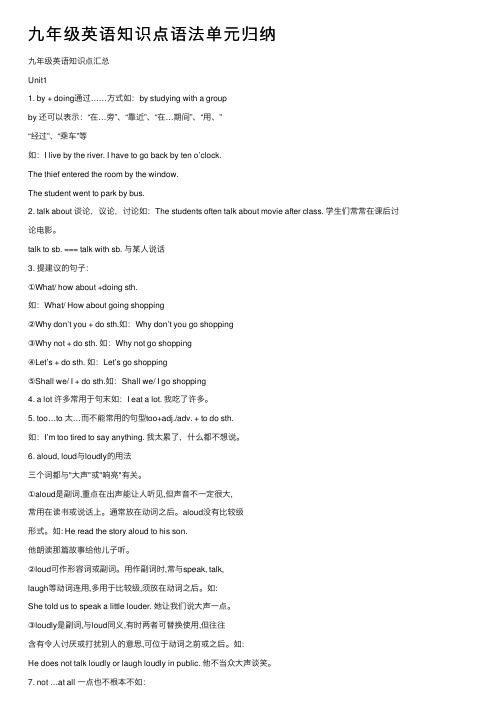
九年级英语知识点语法单元归纳九年级英语知识点汇总Unit11. by + doing通过……⽅式如:by studying with a groupby 还可以表⽰:“在…旁”、“靠近”、“在…期间”、“⽤、”“经过”、“乘车”等如:I live by the river. I have to go back by ten o’clock.The thief entered the room by the window.The student went to park by bus.2. talk about 谈论,议论,讨论如:The students often talk about movie after class. 学⽣们常常在课后讨论电影。
talk to sb. === talk with sb. 与某⼈说话3. 提建议的句⼦:①What/ how about +doing sth.如:What/ How about going shopping②Why don’t you + do sth.如:Why don’t you go shopping③Why not + do sth. 如:Why not go shopping④Let’s + do sth. 如:Let’s go shopping⑤Shall we/ I + do sth.如:Shall we/ I go shopping4. a lot 许多常⽤于句末如:I eat a lot. 我吃了许多。
5. too…to 太…⽽不能常⽤的句型too+adj./adv. + to do sth.如:I’m too tired to say anything. 我太累了,什么都不想说。
6. aloud, loud与loudly的⽤法三个词都与"⼤声"或"响亮"有关。
①aloud是副词,重点在出声能让⼈听见,但声⾳不⼀定很⼤,常⽤在读书或说话上。
人教版初中英语九年级全册各单元知识点、语法归纳整理
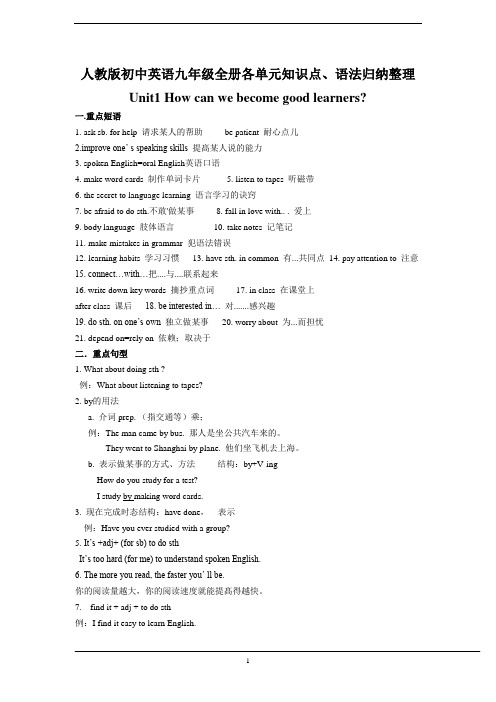
人教版初中英语九年级全册各单元知识点、语法归纳整理Unit1 How can we become good learners?一.重点短语1. ask sb. for help 请求某人的帮助be patient 耐心点儿2.improve one’ s speaking skills 提髙某人说的能力3. spoken English=oral English英语口语4. make word cards 制作单词卡片5. listen to tapes 听磁带6. the secret to language learning 语言学习的诀窍7. be afraid to do sth.不敢'做某事8. fall in love with.. . 爱上9. body language 肢体语言10. take notes 记笔记11.make mistakes in grammar 犯语法错误12.learning habits 学习习惯13. have sth. in common 有...共同点14. pay attention to 注意15. connect…with…把....与....联系起来16. write down key words 摘抄重点词17. in class 在课堂上after class 课后18. be interested in… 对.......感兴趣19. do sth. on one’s own 独立做某事20. worry about 为...而担忧21. depend on=rely on 依赖;取决于二.重点句型1. What about doing sth ?例:What about listening to tapes?2.by的用法a. 介词 prep. (指交通等)乘;例:The man came by bus. 那人是坐公共汽车来的。
九年级英语第一单元知识点归纳总结

九年级英语第一单元知识点归纳总结一、重点词汇1、 textbook n 教科书;课本2、 conversation n 交谈;谈话3、 aloud adv 大声地;出声地4、 pronunciation n 发音;读音5、 sentence n 句子6、 patient adj 有耐心的 n 病人7、 expression n 表情;表示;表达方式8、 discover v 发现;发觉9、 secret n 秘密;秘诀 adj 秘密的;保密的10、 grammar n 语法11、 repeat v 重复;重做12、 note n 笔记;记录 v 注意;指出13、 pal n 朋友;伙伴14、 physics n 物理;物理学15、 chemistry n 化学二、重点短语1、 work with friends 和朋友一起学习2、 make word cards 制作单词卡片3、 read aloud 大声朗读4、 practice conversations with 与练习对话5、 improve speaking skills 提高口语技能6、 give a report 作报告7、 at first 起初;起先8、 word by word 逐词地9、 be patient 有耐心10、 the secret to 的秘诀11、 because of 因为12、 fall in love with 爱上13、 look up 查阅;抬头看14、 take notes 做笔记15、 keep a diary 写日记三、重点句型1、 How do you study for a test? 你是怎样为考试而学习的?2、 I study by working with a group 我通过小组合作来学习。
3、 It's too hard to understand spoken English 英语口语太难懂了。
九年级英语单元知识点(必备12篇)

九年级英语单元知识点(必备12篇)九年级英语单元知识点(1)疑问词是疑问代词“who, whom, what, which, whose”和疑问副词“when, where, how, why ”。
此外,连接词“whether”也适用。
“疑问词+不定式动词”结构有何功用呢?其主要功用有下列五种:⑴当主语,如:When to hold the meeting has not yet beenWhere to live is aHow to cope with the rising cost of living becomes a daily discussion ⑵当宾语,如:We must know what to say at aHe could not tell whom toDo you know how to play bridge?⑶当补足语,如:The problem is where to find the financialThe question is who to⑷当名词同位语,如:Tom had no idea which book to readDo you have a rough impression how to do it?⑸当宾语补足语,如:Jim is not sure whose toMary and John are not certain whether to get married or适用于“疑问词+不定式动词”的动词包括:“know, see, decide, tell, ask, consider, discover, explain, forget, guess, hear, imagine, inquire, learn, remember, think, wonder, understand”等。
有点值得特别注意的是:当这结构当宾语时,它的作用等于名词分句,例如:I could not decide which dictonary to / I could not decide which dictionary I shouldJack did not know where to find such a good Jack did not know where he could find such a good有些动词,如“ask, show, tell, advise, inform, teach”等,可以先有个宾语,然后才接着加上适当的“疑问词+不定式动词”结构。
人教版九年级英语第九单元知识点总结

人教版九年级英语第九单元知识点总结
人教版九年级英语第九单元的知识点总结如下:
1. 词汇和短语:
用法:掌握并能够正确使用本单元所学的词汇和短语,包括它们的拼写、发音和用法。
扩展:通过阅读、写作和听力练习,进一步加深对词汇和短语的掌握。
2. 语法:
现在完成时态:掌握现在完成时态的基本用法,了解其与一般过去时的区别。
常用表达方式:熟悉并掌握一些常用的表达方式,如“so far”、“up to now”、“in the past few years”等。
3. 课文理解:
主题:理解本单元课文的主题,了解不同国家的文化习俗和传统。
细节:能够准确提取课文中的关键信息,理解文章的基本结构和逻辑关系。
4. 口语练习:
常用表达:通过模仿和练习,能够流利地使用本单元所学的日常用语和表达方式。
情景对话:能够在不同的情境下进行有效的交流和沟通,提高口语交际能力。
5. 写作练习:
段落结构:了解并掌握段落的基本结构,能够写出结构清晰、逻辑严谨的段落。
写作技巧:学习并运用一些常用的写作技巧,如转折、因果、比较等,提高写作水平。
6. 听力练习:
听力理解:通过听录音、看视频等方式,提高听力理解能力。
信息提取:能够从听力材料中提取关键信息,并进行归纳总结。
7. 阅读练习:
阅读技巧:掌握一些常用的阅读技巧,如略读、寻读、精读等,提高阅读速度和理解能力。
扩展阅读:通过课外阅读等方式,了解更多不同国家和地区的文化传统和习俗。
- 1、下载文档前请自行甄别文档内容的完整性,平台不提供额外的编辑、内容补充、找答案等附加服务。
- 2、"仅部分预览"的文档,不可在线预览部分如存在完整性等问题,可反馈申请退款(可完整预览的文档不适用该条件!)。
- 3、如文档侵犯您的权益,请联系客服反馈,我们会尽快为您处理(人工客服工作时间:9:00-18:30)。
由“助动词be +及物动词的过去分词”构成助动词be 有人称、数和时态的变化,其变化规则与be 作为连系动词时完全一样。
时态被动语态结构例句一般现在时 amare +过去分词isEnglish is spoken inmany countries.一般过去时 was +过去分词 were + 过去分词 This bridge was built in 1989.情态动词 can/shouldmay +be+过去分词must/……The work must be doneright now.③被动语态的用法当我们不知道谁是动作的执行者,或者没有必要指出谁是动作的执行者,或者只需强调动作的承受者时,要用被动语态。
2. allow sb. to do sth. 允许某人做某事(主动语态)如:Mother allows me to watch TV every night. 妈妈允许我每晚看电视。
be allowed to do sth. 被允许做某事(被动语态)如: LiLy is allowed to go to Qinzhou. 莉莉被允许去钦州。
3. get their ears pierced 穿耳洞让/使(别人)做某事 get sth. done(过去分词)have sth. done 如:I get my car repaired. == I have my car repaired. 我让别人修好我的车 I want to have my hair cut. 我要理发. 4. enough 足够形容词+enough 如:beautiful enough 足够漂亮 enough+名词如:enough food 足够食物 enough to 足够…去做…如:I have enough money to go to Beijing. 我有足够的钱去北京。
She is old enough to go to school.她够大去读书了。
5. stop doing sth. 停止做某事 Please stop speaking.请停止说话。
stop to do sth. 停止下来去做某事 Please stop to speak. 请停下来说话。
6. 看起来好像…sb. seem to do sth. = It seems that +从句 He seems to feel very sad.It seems that he feels very sad. 他看起来好像很伤心。
7.倒装句:由so+助动词(be/do/will/have)/情态动词+主语意为:…也是一样Neither/Nor + be动词/助动词/情态动词+主语(前为否定) 表示与前面所述事实一致. She is a student. So am I. 她是一个学生,我也是。
She went to school just now. So did I . 她刚才去学校了,我也是She has finished the work. So have I . 她已经完成了工作,我也完成了。
She will go to school. So will he. 她将去学校,他也是。
Tom can‟t swim. Neither can John.8. yet 仍然,还常用在否定句或疑问句当中可与although/though连用 9. stay up 熬夜如:I often stay up until 12:00pm.我经常熬夜到12点。
10. clean up 打扫整理如:I have cleaned up the bedroom. 我已经打扫完了卧室。
11. 程度副词:always总是 usually经常 sometimes有时 never从不如:I am always/usually/sometimes/never late for school. 我总是/经常/有时/从不上学迟到。
12. 曾经做某事:Do you ever get to school late? Yes, I do. No, I don‟t.Have you ever got to school late? Yes, I have. No, I haven‟t. 13. go shopping(去购物), go fishing(去钓鱼) go swimming(去游泳), go boating(去划船) go hiking(去登山), go trekking(去徒步) 14. .be strict with+人. be strict in+事物.例: The head teacher is strict with his students He is strict in the work. 15. take the test 参加考试pass the test 通过考试 fail a test 考试失败 16. the other day前几天,不久前的一天.(用于过去时)every other day = every two days 每隔一天(每两天) 17. agree 同意反义词 disagree不同意动词agreement 同意反义词 disagreement 不同意名词 18. keep sb/ sth. +形容词使某人/某物保持…. 如:We should keep our city clean.(cleaningⅹ)我们应该保持我们的城市干净。
Don‟t keep me waiting for a long time.别让我等得太久。
19. both…and… +动词复数形式如: Both Jim and Li Ming play bastketball. 20. learn (sth.) from sb. 向谁学习(什么) 如:Jim learnt English from his English teacher. 吉姆向他的英语老师学习英语 21. have an opportunity to do sth. 有机会做某事 have a chance of doing sth. 有机会做某事如:I have an opportunity to go to Beijing. I have a chance of going to Beijing. 22. at present 目前23. at least 最少 at most 最多 24. 花费 take ,cost, spend , payIt take (sb.) time to do sth. It took (me) 10days to read the book. sth. cost (sb.) …… T he book cost (me) 100yuan. sb. spend … on sth. She spent 10days on this book.sb. spend …doing sth. She spent 10days reading this book.sb. pay … for sth. She paid 10yuan for this book. 25. have +时间段+off 放假,休息如:have 2 days off off 不工作,不上班,不上学,不值班.40. more…than…①与其说…不如说…; 比…更…例: The man is more stupid than nervous. 与其说那人紧张,倒不如说他愚蠢.②在这一结构中,more做adj. 修饰名词,表示“比…多”例:I have more books than you. 我的书比你的多.41.volunteer ① n. 自愿者. ② v. volunteer to do sth. 自愿做…例: We all volunteered to help in the old people‟s home. 我们都志愿到敬老院帮忙. 42. get in the way (of)... 妨碍...例: He never gets in others‟ way. 他从不妨碍别人.The bikes over there will get in the way of others. 自行车放在那里会妨碍别人的. 43. success (n.) successful (adj.) succeed (v.) 44. only 处于句首,并后跟状语时,全句需要倒装.例: Only then did he understand it. 只有到那时,他才明白.Only in this way can we learn English well. 只有这样我们才能把英语学好.Only when she came home, did he learn the news. 当她到家时,他才得知了这消息. 45. care about 关心,在乎,在意.例: No one cares about others nowadays. 现在没人关心别人. I don‟t care about what he does. 我并不在意他干什么.1. if 引导的非真实性条件状语从句即虚拟语气通过动词形式的变化来表示说话人对发生的动作或存在的状态所持的态度或看法的动词形式称为语气,虚拟语气表示说话人所说的话不是事实,而是一种祝愿,建议或是与事实相反的假设等。
If 引导的条件状语从句分为真实和非真实条件句,非真实条件句应用虚拟语气。
如果要表示与现在或将来事实相反时,其虚拟语气结构为:句型条件从句主句谓语动词形式动词过去式(be动词一律用were)would+动词原形即:(从句)if +主语+动词过去式(be 动词用were), 一般过去时(主句) 主语+would+动词原形过去将来时如:If I had time, I would go for a walk.如果我有时间,我就会去散步。
(事实上我现在没有时间) If I were you, I would take an umbrella.假如我是你的话,我会带上雨伞。
(事实上我不是你) I would say no if someone asked me to be in a movie.假如有人请我当电影演员,我会表示拒绝。
(事实上瑞没有人请我当电影演员) 2. pretend to do sth. 假装做某事 I pretended to sleep just now. pretend to be doing sth. 假装正在干某事The students pretended to be writing when the teacher came in. pretend +从句假装… I pretended that I fell asleep. 3. be late for 迟到如:I am late for work/ school/ class/ party.4. a few 与 a little 的区别,few 与 little 的区别⑴ a few 一些修饰可数名词a little 一些修饰不可数名词两者表肯定意义如:He has a few friends. 他有一些朋友。
